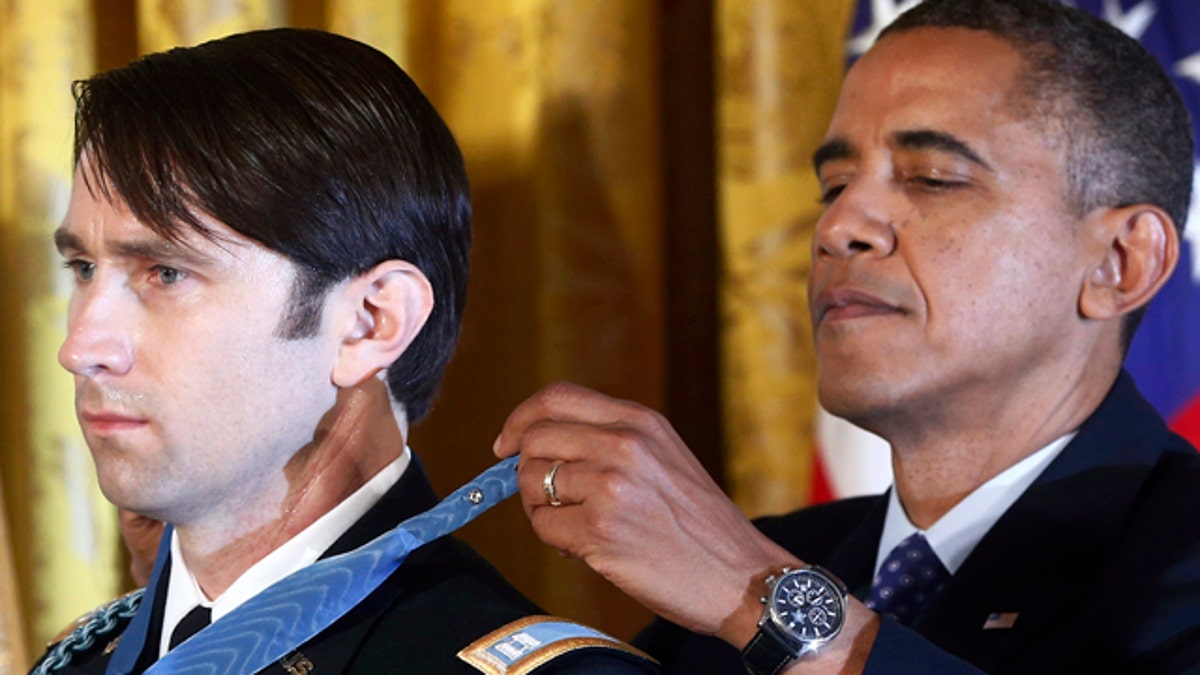
Oct. 15, 2013: President Obama awards the Medal of Honor to former Army Capt. William D. Swenson of Seattle, Wash. (AP)
A Pentagon probe into the mishandling of hero Army Capt. William Swenson's Medal of Honor nomination found retired Army Gen. David Petraeus had sought to downgrade it, but shed no light on why the soldier's file was scrubbed from military computers and never passed up the chain of command.
Swenson, who was nominated for the military's most prestigious award for helping to extract fellow soldiers from a 2009 ambush in Afghanistan's Ganjgal Valley, was given the medal last month by President Obama based on a duplicate file. He and his advocates have expressed bitterness over the fact that his nomination was stalled for four years, and his papers mysteriously purged from Army computers.
There has been speculation that Swenson's heroism was downplayed after he complained to military leaders that many calls for help during the fight were rejected by superior officers. Swenson, 34, of Seattle, said he was disappointed to learn that the probe didn’t hold any individual accountable for the mishandled original nomination.
“An institution can’t heal itself unless it can identify what its weaknesses are, and its weaknesses in this case is an individual,” Swenson told McClatchy. “The investigation failed to meet the standard of a military investigation in which individuals are identified.”
Swenson continued: “Behind every single institutional failure, there’s a name.”
The probe was requested by a lawmaker as a larger investigation into the medal-awarding process, according to McClatchy news service.
Defense Secretary Chuck Hagel apologized to Swenson last month for having to wait so long for the Army to recognize his heroism. Hagel said the Army fixed the error, but said he was sorry Swenson and his family had to endure the processing issues. Hagel also said Swenson proved his valor twice – once on the battlefield and then again by having the courage to question Army brass.
Meanwhile, the findings of the recent Pentagon investigation were outlined in a letter the inspector general’s office sent to Rep. Duncan Hunter, R-Calif., a former Marine who requested the probe as part of a larger effort to overhaul the military award process. In a letter to Inspector General Lynne Halbrooks, Hunter said he was concerned that “these findings further exacerbate the inconsistencies and discrepancies surrounding Swenson’s nomination.”
“It is extraordinarily disconcerting that the facts surrounding Swenson’s Medal of Honor nomination, specific to how it was handled and subsequently lost, still cannot be resolved,” Hunter wrote.
Marine Sgt. Dakota Meyer, 25, of Columbia, Ky., was also awarded the decoration. A McClatchy investigation later found that key portions of the official account of Meyer’s actions were embellished or did not occur.
In its letter to Hunter, the inspector general’s office said investigators interviewed Swenson and 33 other unidentified witnesses and reviewed military award nominations, email records and computer hard drives, McClatchy reports. The inquiry determined that the top U.S. commander in Afghanistan had “recommended downgrading the MoH to a Distinguished Service Cross, which was within his discretion to do.” The Distinguished Service Cross is the Army’s second highest decoration for valor.
The letter, which was obtained by McClatchy, provided no reason for Petraeus’ decision and did not identify the retired Army general by name, referring only to the “former commander, USFOR-A,” the initials of the U.S. force in Afghanistan.
Petraeus reviewed and signed Swenson’s Medal of Honor packet on July 28, 2010, according to the findings of a 2011 internal U.S. military investigation obtained earlier this year by McClatchy.
The Associated Press contributed to this report.

